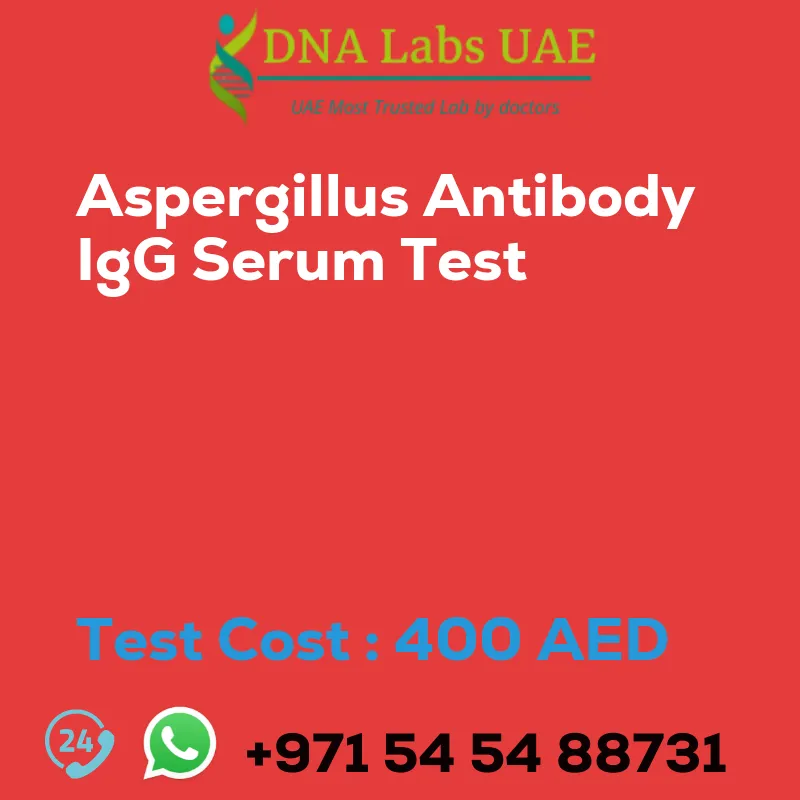ASPERGILLUS ANTIBODY IgG SERUM Test
Test Cost: AED 400.0
Symptoms, Diagnosis, and Referring Details
Test Name: ASPERGILLUS ANTIBODY IgG SERUM Test
Components:
- Price: 400.0 AED
Sample Condition: 2 mL (1 mL min.) serum from 1 SST. Ship refrigerated or frozen.
Report Delivery: Sample Mon / Wed / Fri by 9 am; Report Same day
Method: Enzyme Immunoassay
Test type: Allergy, Disorders of Respiratory system
Doctor: Physician, Chest Physician
Test Department:
Pre Test Information: No special preparation required
Test Details:
The Aspergillus antibody IgG serum test is a laboratory test that measures the level of IgG antibodies specific to the Aspergillus fungus in a person’s blood serum. Aspergillus is a common type of fungus that can cause various respiratory infections, especially in individuals with weakened immune systems. The presence of IgG antibodies indicates that a person has been exposed to Aspergillus and their immune system has mounted an immune response against it. This test is often used to diagnose and monitor Aspergillus infections, such as invasive aspergillosis. It can also be used to assess a person’s immune response to the fungus and to evaluate the effectiveness of treatment.
A blood sample is typically collected from the person and sent to a laboratory for analysis. The laboratory will measure the level of Aspergillus-specific IgG antibodies in the serum using techniques such as enzyme-linked immunosorbent assay (ELISA) or immunofluorescence. Results of the test are reported as a numerical value, indicating the concentration of Aspergillus IgG antibodies in the serum. A higher level of antibodies suggests a recent or ongoing Aspergillus infection, while a lower level may indicate previous exposure or no current infection.
It is important to note that this test measures IgG antibodies specifically and may not detect other types of antibodies, such as IgM or IgA, which can also be produced in response to Aspergillus infection. Additionally, a positive result does not necessarily indicate an active infection, as the antibodies can persist in the blood even after the infection has been treated or resolved. Therefore, the test results should be interpreted in conjunction with other clinical findings and the person’s medical history.
| Test Name | ASPERGILLUS ANTIBODY IgG SERUM Test |
|---|---|
| Components | |
| Price | 400.0 AED |
| Sample Condition | 2 mL (1 mL min.) serum from 1 SST. Ship refrigerated or frozen. |
| Report Delivery | SampleMon / Wed / Fri by 9 am; Report Same day |
| Method | Enzyme Immunoassay |
| Test type | Allergy, Disorders of Respiratory system |
| Doctor | Physician, Chest Physician |
| Test Department: | |
| Pre Test Information | No special preparation required |
| Test Details |
The Aspergillus antibody IgG serum test is a laboratory test that measures the level of IgG antibodies specific to the Aspergillus fungus in a person’s blood serum. Aspergillus is a common type of fungus that can cause various respiratory infections, especially in individuals with weakened immune systems. The presence of IgG antibodies indicates that a person has been exposed to Aspergillus and their immune system has mounted an immune response against it. This test is often used to diagnose and monitor Aspergillus infections, such as invasive aspergillosis. It can also be used to assess a person’s immune response to the fungus and to evaluate the effectiveness of treatment. A blood sample is typically collected from the person and sent to a laboratory for analysis. The laboratory will measure the level of Aspergillus-specific IgG antibodies in the serum using techniques such as enzyme-linked immunosorbent assay (ELISA) or immunofluorescence. Results of the test are reported as a numerical value, indicating the concentration of Aspergillus IgG antibodies in the serum. A higher level of antibodies suggests a recent or ongoing Aspergillus infection, while a lower level may indicate previous exposure or no current infection. It is important to note that this test measures IgG antibodies specifically and may not detect other types of antibodies, such as IgM or IgA, which can also be produced in response to Aspergillus infection. Additionally, a positive result does not necessarily indicate an active infection, as the antibodies can persist in the blood even after the infection has been treated or resolved. Therefore, the test results should be interpreted in conjunction with other clinical findings and the person’s medical history. |








